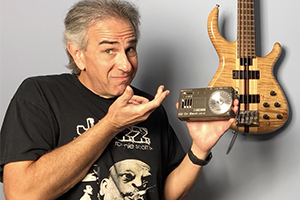Two schools of thought on learning to play in time
By Jon Liebman
Week of September 28, 2020
I was talking to Winston “Wins” Jarquin, bassist for the progressive metal band Sifting, whose interview we published this week on For Bass Players Only. What a fascinating story about growing up in Nicaragua before becoming established on the LA music scene.
When I asked Wins what he thought was important for someone who wants to learn bass, the first thing he said was rhythm, immediately stressing the importance of practicing with a metronome.
I perked up right away, as this can often be a touchy area. I cited Jeff Berlin as the first person who came to my mind when the topic of metronomes comes up.
“Stay on the beat,” Wins emphasizes, “and what I mean by that is play to a metronome. If you have a song that you’re familiar with, play to that song with the metronome. If there’s a line you want to play, play to the metronome. If you have a drummer, have the drummer play to the metronome and play with him.”
That’s when I brought up the two schools of thought, and how some people, like Jeff, are adamantly opposed to using a metronome.
“I don’t disagree with them,” Wins said. “I get where they’re coming from.” Wins just sees things differently. “With my background, being in a metal band,” he says, “for us it’s all about being locked in.”
I have to admit I don’t always use a metronome when I practice. There comes a point where you can just feel if you’re grooving or not. Unless I’m woodshedding something like Paganini’s “Moto Perpetuo” or Rimsky-Korsakoff’s “Flight of the Bumblebee,” pieces that are centered around speed and precision, I’ll generally just dig in without a metronome or a drum machine. What’s important is the end result: Are you grooving with a great time feel and are you making the music feel good?
Wins especially underscores the need to lock in with the drummer, a concept FBPO students have heard me talk about many times. “I could see why,” Wins says, “in some scenarios, like a jam band or something like that, if it calls for it to be a little bit like that ‘drunk’ kind of like rhythm, then yeah, by all means, why not?” referring to metronome use. “But for my purposes,” he says, “it’s all about being locked in.”
How about you? Have a thought on the subject? Leave a comment below and let me know what you think. In the meantime, you can check out my interview with Wins here.






My take on being locked in is important with any band playing together that want to sound good. Being locked in or playing tight is a good professional sounding group
Personally i don’t see anything wrong with using a metronome for when you’re at home practicing .Its all part of the tools one uses when you’re developing your skills on the instrument.Everything helps.
When I was taking lessons from Ed Friedland back in Boston, he always encouraged using a metronome for practicing. And I found that I had a tendency to “push” tempos. Working with the metronome, I’ve gotten that under control. I play with a lot of people that claim to have great time – and they don’t. Sigh! And it’s not just rhythm section players. The difference between a competent lead player and a great one is often their time.
I feel a metronome is essential, because it helps you develop your internal metronome. Another murderous thing is using an eight measure drum loop, where each cycle a measure drops out – leaving the groove up to you. By the time there is one measure of drums and seven measures of silence, you’ll really see what you’re made of. Stolen from Scott’s Bass Lessons.
Practicing with and without a metronome are both equally important. In this “metronomically”-perfect world, it’s a crucial skill to lock in with a click and/or steady sound source and to be able to play behind, in the center or “on top” (ahead) of the beat. However, one shouldn’t rely on a metronome to play with good time. It has to become internal… which is where playing with live musicians (without clicks or tracks) and utilizing the metronome in non-traditional ways is critical (a.k.a. playing at super slow tempos or putting the click on whole notes or on every two bars at faster tempos instead of quarter notes, etc.). Recording and listening back to yourself playing without accompaniment or click will reveal tons. That said, let’s not confuse time with groove, that visceral sense that makes you and those around you want to shake their booties. Although they’re related, one can play with good time but not really groove. How to do that is another discussion.
If you want to be good at your job, you need to be able to keep time. I personally think that a metronome is the most important tool a musician has at their disposal. Even after having played for almost 45 years, I still find challenging ways to incorporate a metronome into my practice routines.
Everyone’s time, (meter), can be better. Once you learn the part, line, groove, use a metronome. It’s a tool. Play with the time. Take that groove and push the time. Lean forward. Bring it back to right on the point of the time. Then lay back.
A good exercise is to start your metronome and clap on the beat, where you don’t hear the click.
It’s to make you more sensitive to where you and the drummer lock.
My Dad made me practice with a metronome when I was pre-teen, and he would patiently count the notes/timing out aloud with me when I practiced. His mom was a piano teacher. My instructors always stressed “work on timing.” I did. In high school, I played drums including with the school jazz band. One of my directors was always pushing me to “not drag” the tempo. I was the perfect candidate to be a bass player. I understood the meaning of groove at an early age. Precise timing is part of it, but you develop that internal metronome with experience. As an adult, to join a blues band, I insisted we have a GOOD drummer, or I wasn’t joining. They did and we grooved just by listening to each other. In other 3 piece bands, I had to be the rock or foundation that drives the band while also creating fills to fill out the sound, and the drummer would follow me, while I followed the lead guitarist or singer. As bass players, we’re the difference between a decent band and a great band by locking into the pocket with the rhythm section with unrelenting DRIVE.
Using various techniques, I encourage my students to be(come) aware of their own sense of time and groove. So, I think to begin practicing without a metronome is good; then, once they think they have it right, its time to check with the metronome.
This approach instills self reliance, i.e. the essential ability to not have to rely on any one or anything else to get good time and groove.
I know a number of people who practice with a metronome and don’t have an issue with that. I have never used a metronome and don’t see the need to and tend to agree with Jeff Berlin’s view that a metronome is not needed to develope a good sense of time. Experience playing music with other musicians in a band/ensemble setting is the key.
In my work I am always playing with a drummer, and practicing with a metronome is like practicing with a battery powered drummer who won’t flirt with your babe or drink all your beer …
I started out playing the drums first, so I am used to using a metronome. So I use one quite a bit.
Being ‘locked-in’ is great. But not being locked-in with a robot but being locked-in with the nuances and feel of your band-mates.